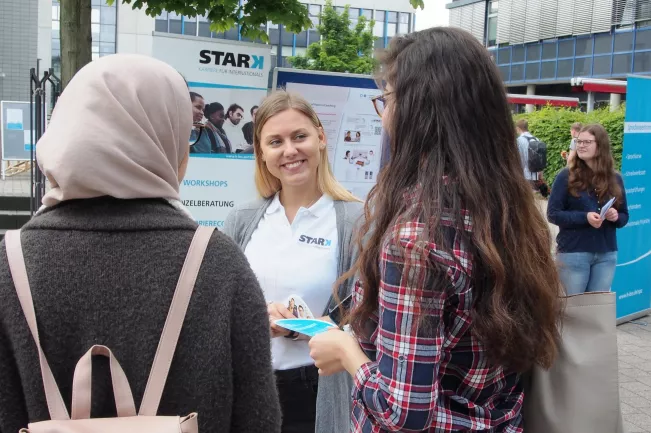Career guide for international students
Career planning during your studies

If you know what your strengths and core skills are, what German employers expect, how application documents should be designed, how to prepare for upcoming interviews and how to find the right job, you will find it much easier to start your career.
Even if your curriculum does not include an internship during your studies, it is recommended that you make an independent effort to complete an internship, perhaps during the semester break. You will have significantly better job prospects on the German labour market if you can demonstrate this kind of experience later on.
To support you in your entry into professional life, Hochschule Bonn-Rhein-Sieg (H-BRS), Rheinische Friedrich-Wilhelms-Universität Bonn (University of Bonn) and other stakeholders have a wide range of services that you can use during your studies to prepare yourself for the labour market and strategically plan your career.
Career counselling

Counselling, coaching and workshops, in which you learn, for example, how to prepare for and present yourself at a job interview, can make your entry into the job easier.
Our offers for you:
coSTARK- Coaching for internationals
Peer coaching by students for international students.
CoSTARK- Career coaching for international students of the H-BRS
The Career coaching serves to international students with their specific, career-related concerns and to facilitate their path into professional practice .
Career Centre of the University of Bonn
The Career Centre is a service facility for students at the University of Bonn. It offers:
support with professional orientation and career planning, counselling and seminars on career orientation and application strategies as well as career events.
Career Service Homepage - University of Bonn (uni-bonn.de) only University of Bonn)
International Office of the University of Bonn
The International Office offers lectures and workshops for international students and PhD students at the University of Bonn on starting a career.
International Office (University of Bonn only)
The Virtual Welcome Centre of the Federal Employment Agency
Would you like to work, study or do an apprenticeship in Germany? The Federal Employment Agency's Virtual Welcome Centre (VWC) is your central contact point for all matters relating to working and living in Germany.
arbeitsagentur.de/fuer-menschen-aus-dem-ausland/beratung-arbeiten-in-deutschland
Career fairs

Career fairs offer you the chance to make personal contact with potential employers for a practical semester or a permanent position. You can often find out exactly what the companies expect from their employees and what their corporate philosophy is like at the exhibition stands. This will help you to decide whether the company is a potential employer for you and whether you would like to apply to the company.
Preparing for a career fair

Preparing for a career fair is important and it is advisable to start a few weeks before the date of the fair.
You should consider the following three steps:
- 1. Preparation
- 2. During the fair
- 3. Follow-up
Before visiting a career fair, you should find out which companies are represented there and which ones you would like to talk to.
H-BRS offers you a webinar on the LEA learning platform, which you can use to prepare for a company fair. If you use this webinar, you will learn how to prepare for a trade fair, what you should pay attention to during the trade fair and what is necessary for good follow-up.
LINKS
Summary of the content of the webinar "Trade fair etiquette"
https://www.h-brs.de/files/related/messe-knigge_zusammengefasst.pdf
Here you will find information on the university's internal career fairs in the Bonn / Rhein-Sieg region:
The Company Day: Career fair for students & career starters
The Company Day is an annual career fair. International students can come into contact with selected companies that are particularly open to international candidates.
Career Day - The job fair in your region
Are you looking for a new professional challenge or are you just at the beginning of your career? Then take your chance and get to know well-known employers from your region at the Careers Day . The extensive supporting programme of this job fair is free of charge
www.karrieretag.org/ (H-BRS only)
Other career fairs for students and graduates, such as Absolventa or Connecticum, can be found on the Internet.
Company visits for orientation and preparation for the start of your career

Since 2015, students and graduates have been getting to know potential employers from the Bonn/Rhein-Sieg/Ahrweiler region at the "Next Stop: Job" series of events. They can find out about future fields of work and possible internships, student research projects and dissertations.
Some of the visits are also held in English.
In preparation for the visits to employers, internships and for all interested parties, lectures and workshops are offered. For example, in the winter semester 2019/2020: "Next stop: job - appearance and impact at companies".
Virtual social networks for the workplace

You can use social networks efficiently to draw attention to yourself and be found by recruiters. An appealing profile is a prerequisite for this. Always view your self-presentation from the perspective of the companies that find you interesting. The best way to present yourself is to create a short, informative biography in which you list your professional experience and qualifications. Be precise in your information about what exactly you are looking for (internship, entry-level job, permanent position).
Find alumni, i.e. graduates from your university, via social business networks. Be courageous! Have the courage to get in touch. The common university background is a good starting point. Alumni may be able to help you with background information on companies that are of interest to you.
Make it a habit to contact people you have met at an event, for example, via a professional social network afterwards. Of course, the usual rules of behaviour and politeness ("netiquette") must also be observed when communicating in business networks.
Use social networks for strategic career planning: Identify people who are role models for you. What training, experience and career stages can be found in their training and career paths? What can you learn from these career paths?
The differentiated search options of business networks also help you to identify companies that could be of interest to you as an employer.

XING is particularly popular in German-speaking countries and enables its users to find new professional contacts, manage existing contacts or exchange messages.
Users present themselves with their own profile. Companies and universities are also "members" of XING and use the platform to search for new employees or check applicant profiles. A professional presence on XING is therefore recommended.
Members of the network can also join various groups to take part in discussions or publicise their own interest or expertise in the group's topic. Anyone who joins the alumni group of their own university(ies) will meet people with the same education and can see the professional steps they took to reach their position.
LINK
In contrast to XING, LinkedIn is increasingly used by international and foreign companies. So if you are aiming for an international career, you should use LinkedIn. Just like XING, LinkedIn allows you to maintain existing business contacts and make new connections. LinkedIn also offers its users the option of creating a profile with a CV in several languages.
LINK
Language courses

As an international student, it is highly recommended that you take advantage of the language courses offered by your university to improve your language skills. A good knowledge of German will make it much easier for you to find a job, as most companies require graduates to have a good command of the German language (at least B2 level).
In addition, the language centre at H-BRS and the language learning centre at the University of Bonn offer a writing workshop or writing lab, consisting of workshops and individual writing advice. The aim is to teach basic techniques for writing different types of texts and to provide individual support for problems with writing term papers and theses.
In addition, the universities support the offer of language tandems in which students with different native languages work together in pairs.
Language Centre of Hochschule Bonn-Rhein-Sieg
The Language Centre offers German language courses, a writing workshop in German - consisting of workshops and individual writing advice - as well as a language tandem programme.
https://www.h-brs.de/de/spz/schreibzentrum
https://www.h-brs.de/en/spz/sprachtandem
(H-BRS only)
Language Learning Centre (SLZ) of the University of Bonn
In the SLZ, students of the University of Bonn can make use of an extensive range of foreign language courses in blended learning format, which is supplemented by a variety of offers for self-learning.
https://www.ikm.uni-bonn.de/en/sprachlernzentrum/sprachlernzentrum
(Bonn University only)
International Affairs administrative unit
The department "German as a Foreign Language" of the International Affairs administrative unit at the University of Bonn is responsible for teaching German and advising on all related issues.
https://www.uni-bonn.de/de/studium/internationale-studierende (University of Bonn only)
Additional offers for refugee students

The Federal Office for Migration and Refugees provides detailed information for refugees on its website in the form of an information sheet, an explanatory video and an app.
Bonn-Rhein-Sieg University of Applied Sciences and the University of Bonn also actively support refugees in integrating into their studies. There are numerous voluntary refugee initiatives as well as a central coordination point of the International Office for counselling, integration and language course support. The NRWege ins Studium programme is funded by the Ministry of Culture and Science of the State of North Rhine-Westphalia and coordinated by the German Academic Exchange Service (DAAD).
Get advice on language integration, integration into studies and funding programmes.
LINKS
Here you can find information on the asylum application and general refugee protection:
https://www.bamf.de/DE/Themen/AsylFluechtlingsschutz/asylfluechtlingsschutz-node.html
Here you will find the services offered by H-BRS for refugees:
https://www.h-brs.de/de/wege-ins-studium